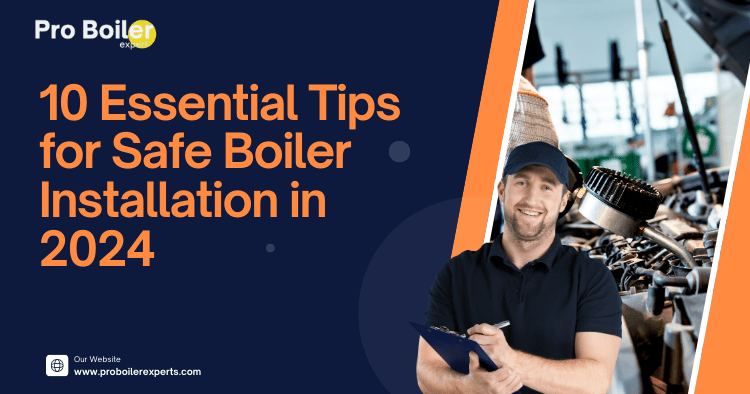10 Essential Tips for Safe Boiler Installation in 2024
Table of Contents
- Understanding Boiler Types
- Choose a Qualified Installer
- Plan Your Installation Location
- Check Local Regulations and Codes
- Ensure Proper Ventilation
- Install Safety Features
- Conduct Regular Maintenance
- Use Quality Equipment
- Educate Yourself
- Stay Informed About Recalls
Understanding Boiler Types
Before jumping into installation, it’s essential to understand the different types of boilers available on the market. The main types include:
- Combi Boilers: These are compact systems that provide both heating and hot water without the need for a separate water tank. Check out the benefits of choosing combi boilers for more insights.
- System Boilers: Ideal for homes with higher hot water demands, these require a hot water cylinder but not a cold water tank. For more details, refer to the benefits of system boilers.
- Regular Boilers: These traditional systems are best suited for larger homes and require both a hot water cylinder and a cold water tank. Explore more about conventional boilers.
Each type has its advantages and disadvantages, so consider your home’s specific needs when making a choice.
Choose a Qualified Installer
Selecting a qualified installer is crucial to ensure your boiler is installed safely and efficiently. Look for professionals who are:
- Gas Safe Registered: In the UK, this ensures that the installer has the necessary qualifications to work with gas appliances. You can check their registration at Gas Safe Register.
- Experienced: Ask for references or read reviews to gauge their past performance.
- Insured: Adequate insurance protects you in case of accidents during the installation.
Choosing the right installer is as important as selecting the right boiler. Don’t underestimate the impact of professional expertise!
Plan Your Installation Location
The location of your boiler is more important than you might think. Consider the following:
- Proximity to Gas Supply: Ensure your boiler is close to the gas inlet.
- Accessibility for Maintenance: Leave enough space around the boiler for easy access.
- Ventilation Requirements: Choose a location that allows for proper airflow.
A well-planned installation site can save both time and money in the long run and enhance efficiency.
Check Local Regulations and Codes
Every region has specific regulations regarding boiler installation. Familiarize yourself with these to avoid legal issues down the line. Consult your local building authority or refer to The International Code Council for guidelines relevant to your area. Ensure your installer is also aware of these codes, as it’s their responsibility to comply with them.
Compliance with local regulations is not just about avoiding fines; it’s about ensuring safety for everyone in your home.
Ensure Proper Ventilation
Proper ventilation is crucial for safe boiler operation. A boiler needs a sufficient supply of air for combustion. Here are some tips:
- Install Ventilation Ducts: Adequate ducts can prevent the buildup of harmful gases.
- Leave Windows Open: In some cases, having nearby windows open can enhance airflow.
- Use Exhaust Fans: If your boiler is in a small or enclosed space, consider installing exhaust fans to maintain air quality.
Never underestimate the role of proper ventilation; it’s a key aspect of boiler safety.
Install Safety Features
Safety features are a must-have in any boiler installation. These can include:
- Pressure Relief Valves: Prevents excessive pressure build-up.
- Carbon Monoxide Detectors: Essential for alerting you to dangerous gas leaks.
- Thermostatic Controls: Helps maintain safe operating temperatures.
Always refer to the manufacturer’s guidelines regarding safety features.
Safety features are your first line of defense against potential hazards. Make sure they are in place!
Conduct Regular Maintenance
After installation, regular maintenance is key for safe operation. Schedule annual inspections with your installer to:
- Check for leaks
- Clean components
- Ensure all safety features are functioning properly
Following a routine maintenance schedule helps prolong the life of your boiler and ensures it operates safely. For more on maintenance tips, refer to essential boiler maintenance tips.
Regular maintenance is like a health check-up for your boiler; it helps catch issues before they become serious problems.
Use Quality Equipment
Investing in high-quality boilers and components can make a significant difference in safety and efficiency. Look for products that are:
- Energy Star Rated: These appliances meet energy efficiency guidelines set by the U.S. Environmental Protection Agency.
- Approved by Recognized Authorities: Check for certifications from organizations like the British Standards Institution (BSI) or Underwriters Laboratories (UL).
Quality equipment is an investment in your home’s safety and efficiency. Don’t cut corners here!
Educate Yourself
Knowledge is power. Familiarize yourself with how your boiler works, its components, and the safety features it includes. You can find valuable information from resources such as:
Understanding your boiler helps you notice any unusual behavior, making it easier to address issues before they escalate.
Stay Informed About Recalls
Occasionally, manufacturers may issue recalls for specific boiler models due to safety concerns. Stay informed by checking:
- Consumer Product Safety Commission
- Manufacturer websites
If your boiler model is recalled, contact your installer immediately for guidance on the next steps.
Being proactive about recalls can prevent serious safety issues. Stay vigilant!
Frequently Asked Questions
Q: How often should I have my boiler serviced?
A: Ideally, you should have your boiler serviced once a year to ensure it’s operating safely and efficiently.
Q: What are the signs that my boiler needs repairs?
A: Look out for unusual noises, leaks, or if the pilot light goes out frequently. If you suspect an issue, contactSure! Please provide the Markdown content that you would like me to convert to HTML.





